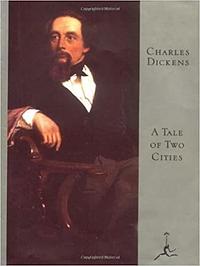Take a photo of a barcode or cover
I forgot how funny Charles Dickens is (in the...ahem, seventeen year gap since I was forced to read Great Expectations in high school). I didn't really forget how much concentration is required to read his prose, though I maybe overestimated how much better I'd be at it now than when I was a kid.
I can't say I remember much in the way of specifics re: my last Dickens experience, but I found the realization of this story was very good. From, "It was the best of times, it was the worst of time," good old Charles lets you know that he's going to hit you with some juxtaposition. You get the unfair imprisonment of Alexandre Manette under one regime and the unfair imprisonment of Charles under another. English trial and French trial. Charles and Sidney, two men who look similar enough to be twins with vastly different lives. Charles should be "bad," considering his upbringing, but is good, though with a penchant for attracting legal trouble. Sidney is "bad" for unknown reasons despite a good upbringing, though everyone still manages to be fond of him.
While the plot drags at times (honestly, I thought I might never get over the hill with the mail at the beginning), it really picks up in the second half, and the ending is, of course, magnificent.
I'm giving three stars for the want of more character depth and development. It's a modern convention, I know, but I am a modern reader clicking imaginary internet stars, so I can do what I want.
I can't say I remember much in the way of specifics re: my last Dickens experience, but I found the realization of this story was very good. From, "It was the best of times, it was the worst of time," good old Charles lets you know that he's going to hit you with some juxtaposition. You get the unfair imprisonment of Alexandre Manette under one regime and the unfair imprisonment of Charles under another. English trial and French trial. Charles and Sidney, two men who look similar enough to be twins with vastly different lives. Charles should be "bad," considering his upbringing, but is good, though with a penchant for attracting legal trouble. Sidney is "bad" for unknown reasons despite a good upbringing, though everyone still manages to be fond of him.
While the plot drags at times (honestly, I thought I might never get over the hill with the mail at the beginning), it really picks up in the second half, and the ending is, of course, magnificent.
I'm giving three stars for the want of more character depth and development. It's a modern convention, I know, but I am a modern reader clicking imaginary internet stars, so I can do what I want.
I put off reading this book for almost a year before I taught it as part of an English 1 class. The first chapters are hard to read, and there are so many different story threads that it didn't capture my attention the first three times I tried to read it. However, by Book the Second I was invested in both the characters and the story, and I can easily understand how this book has become a classic.
My students and I had a lively discussion over whether Charles Dickens overused the "coincidence" to bring his story together. While there are some convenient coincidences, I stand by my assertion that he does it masterfully, unraveling the final moments of the novel to show us how each character got to that point.
This is one I look forward to reading again!
My students and I had a lively discussion over whether Charles Dickens overused the "coincidence" to bring his story together. While there are some convenient coincidences, I stand by my assertion that he does it masterfully, unraveling the final moments of the novel to show us how each character got to that point.
This is one I look forward to reading again!
Not my favorite Charles Dickens, but I am a fan of his writing! Loved Lucie...interesting how she was such a "thread" that ties everyone together using love and kindness. Endeared by her father, Charles Darnay, Sydney Carton & me too.
adventurous
dark
emotional
funny
hopeful
reflective
sad
medium-paced
Plot or Character Driven:
Plot
Strong character development:
Complicated
Loveable characters:
Yes
Diverse cast of characters:
No
Flaws of characters a main focus:
Complicated
Tale differs from other Dickens novels in that there isn't really a main character (consider how many of his books are named after the protagonist). Instead, history, or the history of London and Paris in the late 18th century, is the subject.
The book is on the short side for Dickens, and it often reads as brisk as it races through periods of time, and yet Dickens still finds time for detailed, expansive scenes that balance the pace while maintaining the tension. A particularly masterful chapter, "Echoing Footsteps," takes us through some six full, eventful years in a tender, reflective tone before suddenly dropping us into the middle of the storming of the Bastille, where we get some of Dickens's most bracing, evocative, and disturbing descriptions of the chaos of the crowd.
Events that are major set pieces of other novels, or would be part of the denouement or even climax, are briefly narrated here, if at all. Instead, the book is concerned with the relationship between individuals and social imaginaries, i.e., ideas that focus and organize how people think, feel, and act toward one another.
The most obvious social imaginary, of course, is revolution, rendered starkly in the motto "Liberty, Fraternity, Equality, or Death." Dickens clearly sympathizes with the plight of the lower classes in France. As a loyal British citizen, though, he has a reflexive fear of, or at best ambivalence toward, actual mass movements. In Tale, the legitimate grievances of the oppressed classes morphs into grotesque violence once the guardrails of civil society begin to crumble, at which point the righteousness of their cause becomes a hideous vengefulness. There's literally a character called The Vengeance.
Other social imaginaries that come into question include business, class, and justice, not in the sense that each is criticized but that the unexamined assumptions about them are put under scrutiny. In each case, Dickens's fundamental ethic, which emerges as early as Oliver Twist, is that no system, no social imaginary, can be complacent in its justness if it does harm to individuals.
In the end, Dickens does not try to excuse the Terror or condemn the Revolution. He condemns, rather, mob mentality, political injustice, and inhuman ideologies that justify violence in the name of some purported good. Can we ultimately change these perennial features of human social experience? Tale does not know, for sure. Instead, it suggests that we, as individuals, have to make the best choices we can in the situations in which we find ourselves. History may try to plow over the individual, but the individual still has the freedom to choose how they will respond, though it be the freedom to choose certain death.
The book is on the short side for Dickens, and it often reads as brisk as it races through periods of time, and yet Dickens still finds time for detailed, expansive scenes that balance the pace while maintaining the tension. A particularly masterful chapter, "Echoing Footsteps," takes us through some six full, eventful years in a tender, reflective tone before suddenly dropping us into the middle of the storming of the Bastille, where we get some of Dickens's most bracing, evocative, and disturbing descriptions of the chaos of the crowd.
Events that are major set pieces of other novels, or would be part of the denouement or even climax, are briefly narrated here, if at all. Instead, the book is concerned with the relationship between individuals and social imaginaries, i.e., ideas that focus and organize how people think, feel, and act toward one another.
The most obvious social imaginary, of course, is revolution, rendered starkly in the motto "Liberty, Fraternity, Equality, or Death." Dickens clearly sympathizes with the plight of the lower classes in France. As a loyal British citizen, though, he has a reflexive fear of, or at best ambivalence toward, actual mass movements. In Tale, the legitimate grievances of the oppressed classes morphs into grotesque violence once the guardrails of civil society begin to crumble, at which point the righteousness of their cause becomes a hideous vengefulness. There's literally a character called The Vengeance.
Other social imaginaries that come into question include business, class, and justice, not in the sense that each is criticized but that the unexamined assumptions about them are put under scrutiny. In each case, Dickens's fundamental ethic, which emerges as early as Oliver Twist, is that no system, no social imaginary, can be complacent in its justness if it does harm to individuals.
In the end, Dickens does not try to excuse the Terror or condemn the Revolution. He condemns, rather, mob mentality, political injustice, and inhuman ideologies that justify violence in the name of some purported good. Can we ultimately change these perennial features of human social experience? Tale does not know, for sure. Instead, it suggests that we, as individuals, have to make the best choices we can in the situations in which we find ourselves. History may try to plow over the individual, but the individual still has the freedom to choose how they will respond, though it be the freedom to choose certain death.
adventurous
dark
emotional
hopeful
reflective
sad
tense
slow-paced
Plot or Character Driven:
A mix
Strong character development:
Complicated
Loveable characters:
Complicated
Diverse cast of characters:
No
Flaws of characters a main focus:
No
The only reason I survived this book is because of Sydney Carton. This is the first and probably will be the last Dickens book I will read.
medium-paced
Plot or Character Driven:
A mix
Strong character development:
Yes
Loveable characters:
No
Diverse cast of characters:
Yes
adventurous
challenging
dark
reflective
tense
medium-paced
Plot or Character Driven:
A mix
Strong character development:
Yes
I'm in rural England at the moment and I figured this time of year is the perfect time to sit down and read some Dickens. Ultimately a good read albiet a bit slow in the beginning, a bit hard to read at some points, and really bloody.



